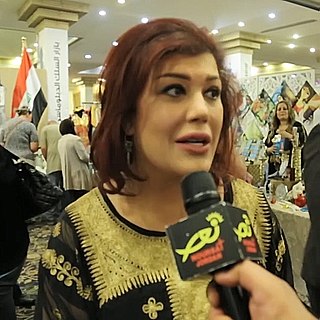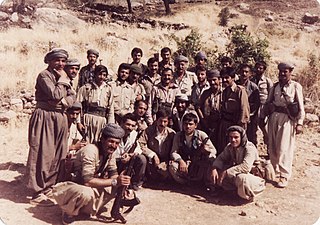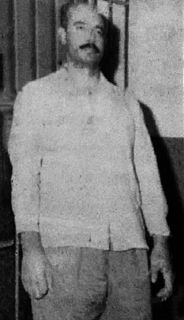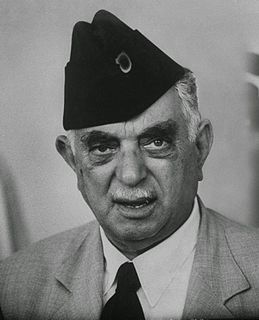
Iraqi Revolutionary Communists (Arabic : تنظيم الشيوعيين الثوريين العراقيين) was the name of an Iraqi political organization, founded in 1973. [1] The group was formed as a split from the Revolutionary Committee of the Iraqi Communist Party led by Salim al-Fakhri. [1] [2] [3] The group was led by Tahsin Ali Ash-Shaikhli (alias 'Yahia al-Iraqi'). [2] [3]

Iraq, officially the Republic of Iraq, is a country in Western Asia, bordered by Turkey to the north, Iran to the east, Kuwait to the southeast, Saudi Arabia to the south, Jordan to the southwest and Syria to the west. The capital, and largest city, is Baghdad. Iraq is home to diverse ethnic groups including Arabs, Kurds, Assyrians, Turkmen, Shabakis, Yazidis, Armenians, Mandeans, Circassians and Kawliya. Around 95% of the country's 37 million citizens are Muslims, with Christianity, Yarsan, Yezidism and Mandeanism also present. The official languages of Iraq are Arabic and Kurdish.
Ash-Shaikhli had been a student activist and joined the Revolutionary Committee in 1964. [1] He was jailed in 1969. [1] Following his release in 1970 he escaped to Jordan but left for Beirut following Black September. [1] In Beirut Ash-Shaikhli maintained contacts with revolutionary leaders such as Abdullah Öcalan. [1]
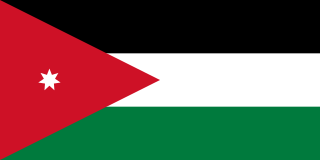
Jordan, officially the Hashemite Kingdom of Jordan, is an Arab country in Western Asia, on the East Bank of the Jordan River. Jordan is bordered by Saudi Arabia to the south and the east, Iraq to the north-east, Syria to the north and Israel and Palestine to the west. The Dead Sea is located along its western borders and the country has a small coastline to the Red Sea in its extreme south-west, but is otherwise landlocked. Jordan is strategically located at the crossroads of Asia, Africa and Europe. The capital, Amman, is Jordan's most populous city as well as the country's economic, political and cultural centre.

Black September was a conflict fought in Jordan between the Jordanian Armed Forces (JAF), under the leadership of King Hussein, and the Palestine Liberation Organisation (PLO), under the leadership of Yasser Arafat, primarily between 16 and 27 September 1970, with certain actions continuing until 17 July 1971.

Abdullah Öcalan, also known as Apo, is a Kurdish leader and one of the founding members of the militant Kurdistan Workers' Party (PKK).
The Organization of Iraqi Revolutionary Communists called for complete rejection of Baathist rule and appealed for armed struggle against the regime. [4] Moreover, it questioned why the Iraqi Communist Party had entered into an alliance with the Baathists, and issued criticism against perceived lack of internal democracy in the Communist Party. [4]
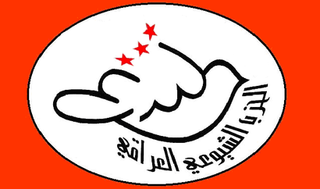
The Iraqi Communist Party is a communist party and the oldest active party in Iraq. Since its foundation in 1934, it has dominated the left in Iraqi politics. It played a prominent role in shaping the political history of Iraq between its foundation and the 1970s. The Party was involved in many of the most important national uprisings and demonstrations of the 1940s and 1950s. It suffered heavily under the Ba'ath Party and Saddam Hussein but remained an important element of the Iraqi opposition and was a vocal opponent of the United Nations sanctions imposed on Iraq after the Gulf War of 1991. It opposed the United States invasion of Iraq in 2003 but since then has participated in the new political institutions. It received little support in the Iraqi general elections of 2005. The party reportedly gained some seats in each province in which the 2013 Iraqi governorate elections were held. The party joined the newly established Sairoun Alliance in the 2018 parliamentary elections, who gained the highest number of votes and a total of 54 seats in the Iraqi parliament. A communist woman representing the alliance, Suhad al-Khateeb, was also elected in the elections to represent the city of Najaf, deemed to be one of the holiest religious and conservative cities in Iraq. Al-Khateeb, who is a teacher and an anti-poverty and women's rights activist, said upon her victory "the Communist party have a long history of honesty – we were not agents for foreign occupations. We want social justice, citizenship, and are against sectarianism, and this is also what Iraqis want."
The organization published a periodical called al-Asas from Beirut. [4] [2] [3] [5]
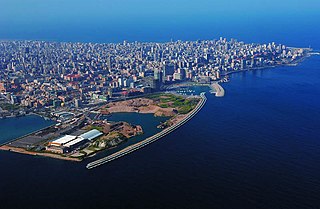
Beirut is the capital and largest city of Lebanon. No recent population census has been conducted, but 2007 estimates ranged from slightly more than 1 million to 2.2 million as part of Greater Beirut. Located on a peninsula at the midpoint of Lebanon's Mediterranean coast, Beirut is the country's largest and main seaport.
Ash-Shaikhli was assassinated in Beirut on March 24, 1980, allegedly by agents of the Iraqi regime. [1] Another key cadre of the group, Ali, was killed in Kurdistan. [5]

Kurdistan or Greater Kurdistan is a roughly defined geo-cultural historical region wherein the Kurdish people form a prominent majority population and Kurdish culture, languages, and national identity have historically been based. Kurdistan roughly encompasses the northwestern Zagros and the eastern Taurus mountain ranges. The territory corresponds to Kurdish irredentist claims.


